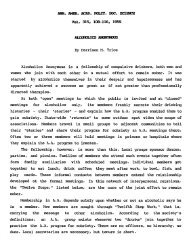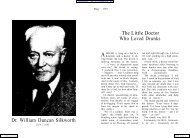<strong>The</strong> cure for my evil and soul-sickness:its replacement by the Absolute and Perfect<strong>The</strong> Oxford Group people spoke frequently about the Four Absolutes, whichwere Absolute Unselfishness, Absolute Love, Absolute Purity, and Absolute Honesty.Leon says that speaking only <strong>of</strong> four absolutes is an oversimplification, becausein fact there are an infinite number <strong>of</strong> positive qualities which make up God’sabsoluteness. God is absolute power, patience, wisdom, love, efficiency, creativity,newness, harmony, bravery, and so on. As long as human beings ask God for help,they can participate in God’s absoluteness, and act, for each moment in which theysurrender to God and cling to his grace, with absolute unselfishness, love, purity,honesty, and so on. [chapter 1, section I]Leon goes on to say: “Absolute and infinite power, wisdom, love, etc.—we maysum all these up by calling them perfection.” [chapter 1, section I] What we have inthis part <strong>of</strong> the Oxford Group’s teaching, in other words, is a doctrine which holdsthat Christian perfection is attainable in this life. One can see this sort <strong>of</strong> teachingappearing in some Quaker theology (both in the early period and in the nineteenthcentury), and in parts <strong>of</strong> the Methodist and Wesleyan tradition. <strong>The</strong>re are still somevery conservative Wesleyan groups in the United States, the second blessing Methodistsas they are called, who not only believe that Christian perfection is attainablein this life, but also argue that no one can be saved who has not achieved Christianperfection. 8I am not GodLeon devotes an important subsection <strong>of</strong> his book to explaining why I mustcome to understand that “I am not God.” [chapter 1, section II] A modern skeptic,he says, might well try to argue that all <strong>of</strong> these Oxford Group claims are the product<strong>of</strong> autohypnosis and naive self-delusion, and that it is only some part <strong>of</strong> my ownmind with which I am coming into contact when I think I am experiencing God.But as Leon points out, I could likewise use that kind <strong>of</strong> pathological skepticism toclaim that other human beings only exist in my own mind. That would be difficultto disprove, would it not? And yet, if I am in difficulty and need help from my fellowhuman beings, I can only be helped if I admit that they really exist.Where is God? Since God and myself-as-a-person (as opposed to my physicalbody) are not things in space, there really is no “where.” But in my experience <strong>of</strong>God, he is inside me rather than outside, in such a way that I can talk about “Godbeing in me” while at the same time “I am in God.”10
Alcoholism and addiction asforms <strong>of</strong> mania (spiritual insanity)<strong>The</strong> self is a disease, Leon says, which results in a mania. Now this is very interesting,because what he means by this, is that the self (and its greed, selfishness, and craving)is in fact a kind <strong>of</strong> spiritual illness or malady which will inevitably manifest itselfin some kind <strong>of</strong> addiction.He uses the old word for alcoholism, dipsomania, which means a maniacal cravingfor alcohol. Just like the A.A. Big Book, Leon sees alcoholism as arising primarilyfrom what in fact is a spiritual malady. But he also perceptively realizes that alcoholismis only one kind <strong>of</strong> addiction. We also have what he calls morphinomania (addictionto morphine and other opiate drugs), satyromania and nymphomania (maleand female forms <strong>of</strong> sexual addiction), cleptomania (compulsive stealing), onanomania(obsessive masturbation), along with the all-dominating lust for power, riches,and glory. Setting up a legalistic set <strong>of</strong> moral rules (whether based on the Bible, theedicts <strong>of</strong> the Pope, the Koran, or the rules laid out in the Twelve Traditions or inA.A. conference decisions) and then trying to follow these fanatically, only throws usinto another kind <strong>of</strong> mania, Leon warns. [chapter 1, section II]It is especially alcoholism, however, which he focuses on to show how a spiritualdisease can give shape and form to a physical addiction.He talks about eight characteristics<strong>of</strong> alcoholic thinking and acting1. Dipsomania (alcoholism) is a compulsion which makes us feel like victims. <strong>The</strong>dipsomaniac believes that “he cannot help himself,” but is held powerless under thecontrol <strong>of</strong> some force which always defeats him.2. It is driven by fear: “he must have his drink, or else—so it seems to him—something terrible will happen, the end <strong>of</strong> the world.”3. His behavior is marked by rigidity (as opposed to variety, novelty, and creativity)and overpowering fear <strong>of</strong> change. Eventually only alcohol will satisfy his unbearablelongings: for joy, comfort, excitement, peace, and the illusion <strong>of</strong> love.4. Pleonectic behavior (from the Greek word pleonektikos): always attempting to takemore than one’s share, “asking for more and more <strong>of</strong> the same thing without end.”Ultimately, there is never enough alcohol to truly satisfy him, no matter how muchhe drinks, and yet even then, he cannot stop.5. Increasing isolationism: like a Cyclops in the Greek myth, the disease <strong>of</strong> alcoholismhides in its cave, so to speak, and “leads a solitary existence, neither helping,nor helped by, its neighbors.”6. <strong>The</strong> disease <strong>of</strong> alcoholism is marked by what St. Augustine called the libidodominandi (the lust to control and dominate others, what Bill W. on pages 61-62 <strong>of</strong>the Big Book called the attempt to play the stage director): “like a tyrant, it tends to11
- Page 1 and 2: The Philosophyof Courageor The Oxfo
- Page 3 and 4: fear of being creative and being ou
- Page 5 and 6: truly were. There was also a spirit
- Page 7 and 8: Comparison with Bill W. and A.A.on
- Page 9: I must embrace my own feeling of so
- Page 13 and 14: specifications as to how that is to
- Page 15 and 16: perfect serenity. By shutting off a
- Page 17 and 18: The act of total surrender allows t
- Page 19 and 20: this. But you do not have to be any
- Page 21 and 22: NOTES ON CHAPTER 3. SHARING OR SPRE
- Page 23 and 24: [chapter 3, section II]If I am succ
- Page 25 and 26: NOTES ON CHAPTER 4. CHANGING SOCIET
- Page 27 and 28: The Oxford Group and Alcoholics Ano
- Page 29 and 30: view Press, 2000) 28. “Sick origi
- Page 31 and 32: INTRODUCTIONThe world is going mad,
- Page 33 and 34: TRUE RELIGIONWhy are you cowards, p
- Page 35 and 36: CONTENTSIntroductionTrue Religion31
- Page 37 and 38: to do the same for the term “pixi
- Page 39 and 40: the power which is God or from God.
- Page 41 and 42: God. The reader who is asked to con
- Page 43 and 44: these qualities and on the relation
- Page 45 and 46: y the power of God. But it is not n
- Page 47 and 48: IIMYSELFI AM NOT GODThe objection l
- Page 49 and 50: DISEASE OR FEAR: MANIAWhat is wrong
- Page 51 and 52: impurity which is denoted by the si
- Page 53 and 54: occasions when he is threatened wit
- Page 55 and 56: IIIHEALTH OR PASSIONPURE DESIRESinc
- Page 57 and 58: PASSION AND PARTICULAR DESIRESNot b
- Page 59 and 60: Chapter 2DEMONSTRATION BY EXPERIMEN
- Page 61 and 62:
to desire passionately to be health
- Page 63 and 64:
Conformity with the commandment aga
- Page 65 and 66:
IITHE CRUCIAL EXPERIMENT ORTHE QUIE
- Page 67 and 68:
and hypocrisy, that judged by absol
- Page 69 and 70:
not meant; that the fool was not as
- Page 71 and 72:
hands I commit my spirit.”With th
- Page 73 and 74:
that God the Highwayman is really a
- Page 75 and 76:
I obey guidance to go and see a man
- Page 77 and 78:
foreseen or seen as I have represen
- Page 79 and 80:
AN ILLUSTRATIONBecause the checking
- Page 81 and 82:
IVTHE QUITE TIME AND THEH WORKING D
- Page 83 and 84:
NEED FOR AN ADEQUATE PSYCHOLOGY OF
- Page 85 and 86:
only to poets. But to judge from on
- Page 87 and 88:
For the first time passion or the r
- Page 89 and 90:
HEAVENWhat I have come to is Heaven
- Page 91 and 92:
For Heaven is now no longer a dream
- Page 93 and 94:
I am contiguous with other selves i
- Page 95 and 96:
expanses of self, seem to be experi
- Page 97 and 98:
IITHE STRATEGY OF THE LARGER SELFGO
- Page 99 and 100:
FEAR CONCEALS FEARNow the procedure
- Page 101 and 102:
exposure of the “universe.” Tru
- Page 103 and 104:
IIITHE STRATEGY AGAINST THE LARGER
- Page 105 and 106:
his own. The miracle of self-consci
- Page 107 and 108:
usiness, for government, for the na
- Page 109 and 110:
and then make him follow its course
- Page 111 and 112:
importance to the Company. However,
- Page 113 and 114:
of smugness, self-satisfaction and
- Page 115 and 116:
PREOCCUPATION WITH SYMPTOMSWhen “
- Page 117 and 118:
channel through which collective gu
- Page 119 and 120:
abyss and the area coincide. It is
- Page 121 and 122:
IVTHE ECONOMIC PROBLEMTHE ECONOMIC
- Page 123 and 124:
that need or greed, and not the cap
- Page 125 and 126:
VPOLITICAL SCIENCEUNCHANGED POLITIC
- Page 127 and 128:
it, by blaming other people instead
- Page 129 and 130:
VIPHILOSOPHY AND ARTTHE SINS OF THE
- Page 131 and 132:
For expression or projection is the
- Page 133 and 134:
DENYING THE SEPARATION BETWEEN THE
- Page 135 and 136:
which the errors are designed to pr
- Page 137 and 138:
A PERSONAL NOTEThe philosophy given
- Page 139 and 140:
the formation of sacred stereotypes















